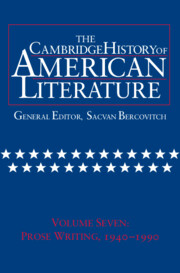Book contents
- Frontmatter
- Introduction
- The Drama, 1940—1990
- Fiction and Society, 1940–1970
- After the Southern Renascence
- 1 Introduction
- 2 Robert Penn Warren
- 3 Carson McCullers
- 4 Flannery O’Connor
- 5 Eudora Welty
- 6 Novels of Race and Class
- 7 Novels of Slavery and Reconstruction
- 8 Walker Percy
- 9 Reynolds Price
- 10 Peter Taylor
- Postmodern Fictions, 1960–1990
- Emergent Literatures
- Appendix: Biographies
- Chronology, 1940–1990
- Bibliography
- Index
3 - Carson McCullers
from After the Southern Renascence
Published online by Cambridge University Press: 28 March 2008
- Frontmatter
- Introduction
- The Drama, 1940—1990
- Fiction and Society, 1940–1970
- After the Southern Renascence
- 1 Introduction
- 2 Robert Penn Warren
- 3 Carson McCullers
- 4 Flannery O’Connor
- 5 Eudora Welty
- 6 Novels of Race and Class
- 7 Novels of Slavery and Reconstruction
- 8 Walker Percy
- 9 Reynolds Price
- 10 Peter Taylor
- Postmodern Fictions, 1960–1990
- Emergent Literatures
- Appendix: Biographies
- Chronology, 1940–1990
- Bibliography
- Index
Summary
When at twenty-three Carson McCullers came to fame in 1940 with The Heart Is a Lonely Hunter, her first readers thought they knew very well what to make of her. With Erskine Caldwell (and with a completely misread William Faulkner), she was described as a member of the Southern Gothic school, a purgatorial figment of the Northern imagination to which Flannery O’Connor was also consigned. Of her second novel, Reflections in a Golden Eye (1941), Time magazine said, with characteristic fatuity, that it “is the Southern school at its most Gothic, but also at its best. It is as though William Faulkner saw to the bottom of matters which merely excite him, shed his stylistic faults, and wrote it all out with Tolstoyan lucidity.” By the time of Clock Without Hands (1961), her fame had faded considerably, and now few critics put her in the first rank even of Southern writers of her own generation. She did have considerable influence, however; Tennessee Williams’s The Glass Menagerie (1945), in its sense of emotional thwartedness and its concern with the overpowering misery and hidden obsessions of its characters, owes a great deal to McCullers, as does the brooding lyricism and pungent sexual strangeness of Truman Capote’s first novel Other Voices, Other Rooms (1948). (Indeed, Idabell Thompkins in the latter novel could be the blood sister of Mick Kelly in The Heart Is a Lonely Hunter.)
- Type
- Chapter
- Information
- The Cambridge History of American Literature , pp. 342 - 346Publisher: Cambridge University PressPrint publication year: 1999

